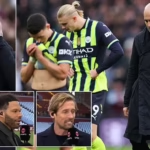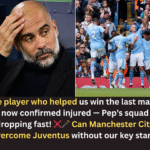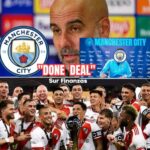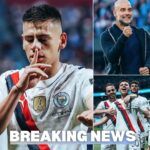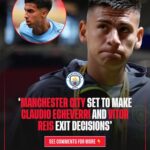Pep Guardiola has confirmed That Manchester City Star Boy will be out for two or three weeks with an ankle injury.
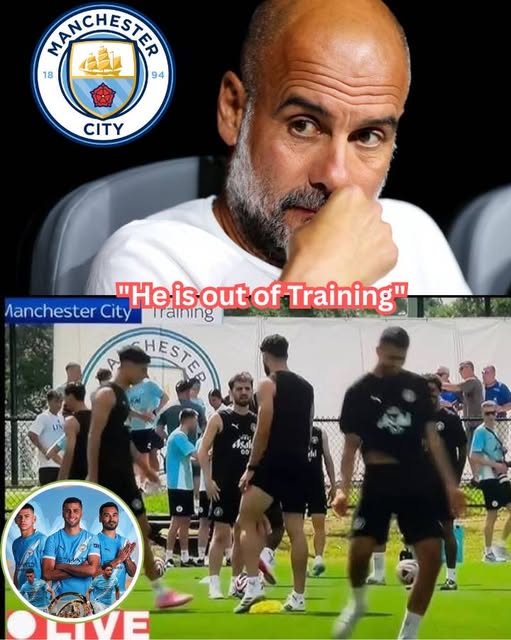
Manchester City manager Pep Guardiola has delivered disappointing news regarding one of the club’s most promising young talents, confirming that Claudio Echeverri will be sidelined for two to three weeks due to an ankle injury sustained during the Club World Cup campaign. The 19-year-old Argentine midfielder’s absence represents not only a personal setback for the player but also a tactical challenge for Guardiola as City navigates the crucial stages of multiple competitions.
The Injury Incident and Immediate Impact
The injury occurred during Manchester City’s dominant 6-0 victory over Al Ain in the Club World Cup group stage, a match that showcased the depth and quality of City’s squad rotation policy. Echeverri had been making a significant impression in the first half, contributing a goal to the comprehensive victory before being forced to withdraw at halftime due to the ankle problem that would subsequently rule him out of competitive action for the coming weeks.
Speaking candidly about the situation, Guardiola expressed genuine empathy for the young player’s predicament. “It will be two weeks, three weeks out. We feel so sorry for him, all of us! But we’re going to play new players, and in the next game, too… And in the second-half, too,” the Spanish tactician revealed, highlighting both his concern for Echeverri’s wellbeing and his pragmatic approach to squad management during this challenging period.
The timing of the injury is particularly unfortunate for Echeverri, who had been gaining momentum in his development at the Etihad Stadium. His goal against Al Ain was not merely a statistical achievement but a demonstration of his growing confidence and integration into Guardiola’s tactical system. The setback now threatens to interrupt what had been a promising trajectory in his early Manchester City career.
Echeverri’s Journey to Manchester City
To understand the significance of this injury, it’s essential to examine Echeverri’s path to becoming a Manchester City player. The Argentine arrived at the club with considerable expectations, having established himself as one of South America’s most promising young talents. His development through River Plate’s renowned youth system provided him with the technical foundation and tactical understanding that made him an attractive prospect for European clubs.
Guardiola’s interest in Echeverri reflects the manager’s consistent commitment to nurturing young talent while maintaining the highest competitive standards. The Catalan coach has historically demonstrated an ability to integrate emerging players into elite-level football, and Echeverri represented another opportunity to continue this tradition at Manchester City.
The 19-year-old’s playing style aligns well with Guardiola’s tactical philosophy, combining technical proficiency with the intelligence to operate in the complex positional systems that define City’s approach. His versatility across multiple midfield positions provides Guardiola with tactical flexibility, making his current absence all the more frustrating from a squad management perspective.
The Broader Context of City’s Squad Rotation
Echeverri’s injury occurs within the broader context of Manchester City’s comprehensive squad rotation strategy during the demanding winter fixture period. Guardiola has consistently emphasized the importance of managing player workloads to maintain performance levels across multiple competitions, and the Club World Cup presents additional challenges in this regard.
The sweltering weather conditions in Saudi Arabia, where the tournament is being held, add another layer of complexity to squad management decisions. Guardiola’s comments about making strategic substitutions and rotating players reflect his awareness of these environmental factors and their potential impact on player welfare and performance.
“We’re going to play new players, and in the next game, too… And in the second-half, too,” Guardiola’s statement indicates a comprehensive approach to rotation that extends beyond simply replacing injured players. This philosophy reflects his understanding that sustainable success requires careful management of the entire squad, particularly during intensive tournament periods.
Tactical Implications and Adjustments
From a tactical perspective, Echeverri’s absence forces Guardiola to reconsider his options for the crucial match against Juventus and beyond. The young Argentine’s ability to operate in multiple positions had provided the manager with valuable flexibility in his team selection, and his injury necessitates alternative solutions.
Guardiola’s tactical system relies heavily on players who can adapt to different roles within the same match, and Echeverri had been developing into exactly this type of versatile performer. His absence means that other players must step up to fill this multifunctional role, potentially affecting the overall balance and fluidity of City’s play.
The injury also highlights the delicate balance between giving young players valuable experience and protecting them from excessive physical demands. While Echeverri’s involvement in the Club World Cup represented an opportunity for development, the injury serves as a reminder of the inherent risks involved in competitive football at the highest level.
The Juventus Challenge and Group Stage Implications
The immediate tactical challenge facing Guardiola is the upcoming match against Juventus, a fixture that carries significant implications for Manchester City’s progression in the Club World Cup. The need to secure victory to top the group and potentially avoid facing Real Madrid in the last 16 adds pressure to team selection decisions.
Juventus represents a formidable opponent with their own tactical sophistication and competitive experience. Their presence in the tournament reflects their status as one of Europe’s elite clubs, and they will undoubtedly provide a stern test for whatever lineup Guardiola ultimately selects.
The absence of Echeverri removes one option from Guardiola’s tactical arsenal, but it also creates opportunities for other players to demonstrate their capabilities. This dynamic reflects the competitive environment that Guardiola has cultivated at Manchester City, where every player must be ready to contribute when called upon.
Player Development Philosophy at Manchester City
Echeverri’s situation exemplifies the broader player development philosophy that Guardiola and Manchester City have established. The club’s commitment to nurturing young talent while maintaining competitive excellence requires careful balance and strategic planning.
The injury setback, while disappointing, represents part of the natural development process for young players. How Echeverri responds to this challenge will likely influence his long-term development and integration into the first team. Guardiola’s experience with young players suggests that he will provide the necessary support and guidance during the recovery period.
Manchester City’s approach to youth development extends beyond simply providing playing opportunities. The club’s comprehensive support structure, including medical and fitness staff, ensures that injured players receive optimal care and rehabilitation support. This infrastructure will be crucial in Echeverri’s recovery process.
The Physical Demands of Modern Football
Echeverri’s ankle injury also highlights the intense physical demands placed on modern football players, particularly those operating at the highest level. The combination of technical demands, tactical complexity, and physical intensity creates an environment where injuries are an unfortunate but inevitable reality.
Young players face particular challenges in adapting to these demands, as their bodies continue to develop while being exposed to elite-level competition. The transition from youth football to senior professional competition represents a significant step up in terms of physical requirements and injury risk.
Guardiola’s management of young players typically involves careful consideration of these physical factors. His rotation policy and strategic use of substitutions reflect an understanding of the need to balance competitive demands with player welfare, particularly for emerging talents like Echeverri.
Recovery and Rehabilitation Process
The two to three week timeline for Echeverri’s recovery suggests a moderate ankle injury that, while frustrating, should not have long-term implications for his career development. Manchester City’s medical team will work closely with the player to ensure optimal recovery and prevent recurrence of the problem.
Modern sports medicine and rehabilitation techniques mean that ankle injuries of this nature can typically be managed effectively, allowing players to return to full fitness without lasting effects. The key will be ensuring that Echeverri does not rush his return and that he completes a comprehensive rehabilitation program.
The psychological aspect of injury recovery is equally important, particularly for young players. Echeverri will need to maintain his confidence and motivation during the layoff period, using the time productively to continue his tactical education and physical conditioning where possible.
Impact on Team Dynamics and Morale
Guardiola’s expression of sympathy for Echeverri reflects the close-knit nature of the Manchester City squad and the genuine concern that exists between coaching staff and players. This supportive environment is crucial for young players dealing with setbacks and challenges.
The injury also provides an opportunity for other squad members to step up and demonstrate their capabilities. Guardiola’s comments about playing “new players” suggest that he views this as a chance to evaluate different options and potentially discover new solutions to tactical challenges.
Team morale and unity often strengthen during periods when players face individual challenges. The support shown to Echeverri by his teammates and coaching staff will likely contribute to the overall cohesion and spirit within the squad.
Looking Ahead: Future Opportunities
Despite the immediate disappointment of the injury, Echeverri’s long-term prospects at Manchester City remain bright. The setback represents a temporary obstacle rather than a fundamental change in his development trajectory. Young players often emerge stronger from injury experiences, having gained perspective and motivation from the challenge.
Guardiola’s track record with young players suggests that Echeverri will receive continued support and opportunities upon his return to fitness. The manager’s commitment to youth development means that short-term setbacks rarely derail long-term career prospects for talented players.
The experience of dealing with injury and recovery will likely contribute to Echeverri’s overall development as a professional footballer. Learning to handle setbacks, maintain fitness during layoffs, and return to competitive action are all valuable skills that will serve him well throughout his career.
Conclusion: A Temporary Setback in a Promising Journey
Claudio Echeverri’s ankle injury represents a frustrating but temporary interruption in what has been an encouraging start to his Manchester City career. While the two to three week absence will deny him valuable playing time and experience, the long-term impact should be minimal given proper management and rehabilitation.
Pep Guardiola’s handling of the situation demonstrates the careful balance required when managing young talent at the highest level. His expression of genuine concern for Echeverri’s wellbeing, combined with pragmatic planning for tactical adjustments, reflects the comprehensive approach that has made him successful in developing young players throughout his career.
The injury also highlights the unpredictable nature of football and the importance of squad depth in competing across multiple competitions. Manchester City’s ability to adapt and continue performing despite individual setbacks will be tested in the coming weeks, providing opportunities for other players to contribute to the team’s success.
For Echeverri personally, this setback represents an early lesson in the challenges and demands of professional football at the highest level. How he responds to this adversity will likely influence his development and future success at Manchester City. With the support of Guardiola and the club’s comprehensive development structure, he is well-positioned to return stronger and more determined than before.
The broader implications of this injury extend beyond the immediate tactical considerations, touching on themes of player development, squad management, and the physical demands of modern football. As Manchester City continues their pursuit of success across multiple competitions, they will need to demonstrate the resilience and adaptability that have characterized their success under Guardiola’s leadership.
Ultimately, while Claudio Echeverri’s injury is undoubtedly disappointing for all concerned, it represents just one chapter in what promises to be a long and successful career at the highest level of football. The temporary setback will soon be forgotten as he continues his development as one of Manchester City’s most promising young talents.
